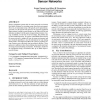Free Online Productivity Tools
i2Speak
i2Symbol
i2OCR
iTex2Img
iWeb2Print
iWeb2Shot
i2Type
iPdf2Split
iPdf2Merge
i2Bopomofo
i2Arabic
i2Style
i2Image
i2PDF
iLatex2Rtf
Sci2ools
104
Voted
ISLPED
2003
ACM
2003
ACM
An environmental energy harvesting framework for sensor networks
Energy constrained systems such as sensor networks can increase their usable lifetimes by extracting energy from their environment. However, environmental energy will typically not be spread homogeneously over the spread of the network. We argue that significant improvements in usable system lifetime can be achieved if the task allocation is aligned with the spatio-temporal characteristics of energy availability. To the best of our knowledge, this problem has not been addressed before. We present a distributed framework for the sensor network to adaptively learn its energy environment and give localized algorithms to use this information for task sharing among nodes. Our framework allows the system to exploit its energy resources more efficiently, thus increasing its lifetime. These gains are in addition to those from utilizing sleep modes and residual energy based scheduling mechanisms. Performance studies for an experimental energy environment show up to 200% improvement in lifeti...
Related Content
| Added | 05 Jul 2010 |
| Updated | 05 Jul 2010 |
| Type | Conference |
| Year | 2003 |
| Where | ISLPED |
| Authors | Aman Kansal, Mani B. Srivastava |
Comments (0)

